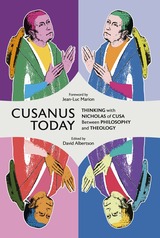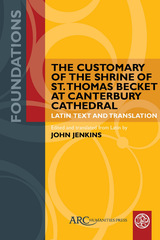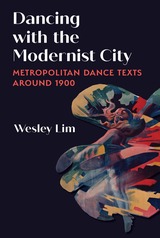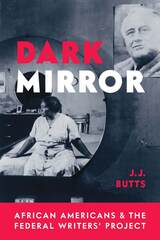1096 scholarly books by Catholic University of America Press and 72
start with A
1096 scholarly books by Catholic University of America Press and 72
1096 scholarly books by Catholic University of America Press
72 start with A start with A
72 start with A start with A
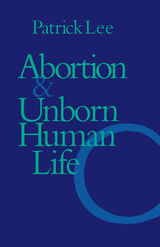
Abortion and Unborn Human Life
Patrick Lee
Catholic University of America Press, 1996
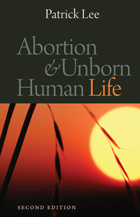
Abortion and Unborn Human Life, Second Edition
Patrick Lee
Catholic University of America Press, 2010
Patrick Lee surveys the main philosophical arguments in favor of the moral permissibility of abortion and refutes them point by point. In a calm and philosophically sophisticated manner, he presents a powerful case for the pro-life position and a serious challenge to all of the main philosophical arguments on behalf of the pro-choice position.
[more]
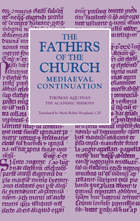
The Academic Sermons (The Fathers of the Church, Mediaeval Continuation, Volume 11)
Thomas Aquinas
Catholic University of America Press, 2010
No description available
[more]
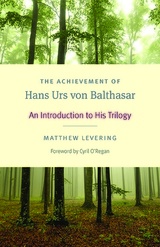
The Achievement of Hans Urs von Balthasar
Matthew Levering
Catholic University of America Press, 2019
In The Achievement of Hans Urs von Balthasar, Matthew Levering has written a book for theologically educated readers who mistrust von Balthasar or who mistrust von Balthasar’s critics. The book shows that von Balthasar’s critics can and should benefit both from the rich and wide-ranging conversations that mark his trilogy and from the critical and constructive engagement with German philosophical modernity offered by the trilogy. In addition, Levering hopes to show that those who mistrust von Balthasar’s critics need to be more Balthasarian in their response to criticisms of the Swiss theologian.
[more]
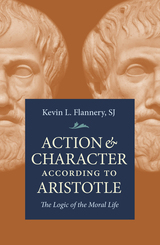
Action and Character According to Aristotle
Kevin L. Flannery, SJ
Catholic University of America Press, 2013
This book will appeal to professional scholars and graduate students with an interest in Aristotles ethics and in ethics generally. It proposes comprehensive interpretations of some difficult passages in Aristotles two major ethical works ( the Nicomachean Ethics and the Eudemian Ethics ). It brings to bear upon the analysis of human behavior passages in Aristotles logical works and in his Physics. It also draws connections among areas of particular interest to contemporary ethics: action theory, the analysis of practical reason, and virtue ethics.
[more]
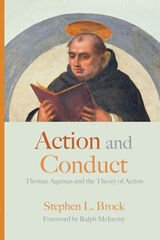
Action and Conduct
Thomas Aquinas and the Theory of Action
Stephen Brock
Catholic University of America Press, 2021
"Both Thomistic scholars and analytic philosophers interested in theories of human action and accountability will find this book a welcome addition to their libraries. Truly a substantive addition to both Thomistic scholarship and the ongoing analytic investigation into human action and responsible agency."—American Catholic Philosophical Quarterly
"A first-rate book...Brock's lucid and illuminating analysis offers much of value to both intellectual historians and theologians, as well as philosophers."—Theological Studies"Brock's treatment of Aquinas's account of action exhibits a rare combination of rigor and learning. It is, no doubt, the best we have."—The Thomist
"A first-rate book...Brock's lucid and illuminating analysis offers much of value to both intellectual historians and theologians, as well as philosophers."—Theological Studies"Brock's treatment of Aquinas's account of action exhibits a rare combination of rigor and learning. It is, no doubt, the best we have."—The Thomist
[more]
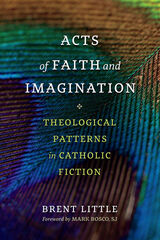
Acts of Faith and Imagination
Theological Patterns in Catholic Fiction
Brent Little
Catholic University of America Press, 2023
Acts of Faith and Imagination wagers that fiction written by Catholic authors assists readers to reflect critically on the question: “what is faith?” To speak of a person’s “faith-life” is to speak of change and development. As a narrative form, literature can illustrate the dynamics of faith, which remains in flux over the course of one’s life. Because human beings must possess faith in something (whether religious or not), it inevitably has a narrative structure—faith ebbs and flows, flourishes and decays, develops and stagnates.
Through an exploration of more than a dozen Catholic authors’ novels and short stories, Brent Little argues that Catholic fiction encourages the reader to reflect upon their faith holistically, that is, the way faith informs one’s affections, and how a person conceives and interacts with the world as embodied beings. Amidst the diverse stories of modern and contemporary fiction, a consistent pattern emerges: Catholic fiction portrays faith—at its most fundamental, often unconscious, level—as an act of the imagination. Faith is the way one imagines themselves, others, and creation. A person’s primary faith conditions how they live in the world, regardless of the level of conscious reflection, and regardless of whether this is a “religious” faith.
Acts of Faith and Imagination investigates the creative depth and vitality of the Catholic literary imagination by bringing late modern Catholic authors into dialogue with more contemporary ones. Readers will then consider well-known works, such as those by Graham Greene, Flannery O’Connor, and Muriel Spark in the fresh light of contemporary stories by Toni Morrison, Alice McDermott, Uwem Akpan, and several others.
[more]
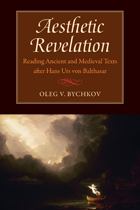
Aesthetic Revelation
Reading Ancient and Medieval Texts after Hans Urs von Balthasar
Oleg Bychkov
Catholic University of America Press, 2010
Oleg Bychkov's masterly exposition also shows how the texts analyzed have significantly influenced the development of Western theological thought.
[more]

After the Fall
War and Occupation in Irène Némirovsky's Suite française
Nathan Bracher
Catholic University of America Press, 2010
In this work, the first critical monograph on Suite française, Nathan Bracher shows how, first amid the chaos and panic of the May-June 1940 debacle, and then within the unsettling new order of the German occupation, Némirovsky's novel casts a particularly revealing light on the behavior and attitudes of the French as well as on the highly problematic interaction of France's social classes
[more]
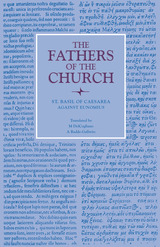
Against Eunomius
St. Basil of Caesarea
Catholic University of America Press, 2011
Basil of Caesarea is considered one of the architects of the Pro-Nicene Trinitarian doctrine adopted at the Council of Constantinople in 381, which eastern and western Christians to this day profess as ""orthodox."" Nowhere is his Trinitarian theology more clearly expressed than in his first major doctrinal work, Against Eunomius, finished in 364 or 365 CE. Responding to Eunomius, whose Apology gave renewed impetus to a tradition of starkly subordinationist Trinitarian theology that would survive for decades, Basil's Against Eunomius reflects the intense controversy raging at that time among Christians across the Mediterranean world over who God is. In this treatise, Basil attempts to articulate a theology both of God's unitary essence and of the distinctive features that characterize the Father, Son, and Holy Spirit--a distinction that some hail as the cornerstone of ""Cappadocian"" theology. In Against Eunomius, we see the clash not simply of two dogmatic positions on the doctrine of the Trinity, but of two fundamentally opposed theological methods. Basil's treatise is as much about how theology ought to be done and what human beings can and cannot know about God as it is about the exposition of Trinitarian doctrine. Thus Against Eunomius marks a turning point in the Trinitarian debates of the fourth century, for the first time addressing the methodological and epistemological differences that gave rise to theological differences. Amidst the polemical vitriol of Against Eunomius is a call to epistemological humility on the part of the theologian, a call to recognize the limitations of even the best theology. While Basil refined his theology through the course of his career, Against Eunomius remains a testament to his early theological development and a privileged window into the Trinitarian controversies of the mid-fourth century.
[more]
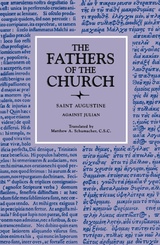
Against Julian
Saint Augustine
Catholic University of America Press, 1957
In Against Julian Augustine stresses in the first two books the traditional teachings of the Church found in the Fathers and contrasts their teaching with the rationalism of the Pelagians
[more]
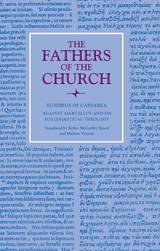
Against Marcellus and On Ecclesiastical History
Kelly Eusebius of Caesarea
Catholic University of America Press, 2018
This is the first English translation of the last two theological works of Eusebius of Caesarea, Against Marcellus and On Ecclesiastical Theology. The first text was composed after the deposition of Marcellus of Ancyra in 336 to justify the action of the council fathers in ordering the deposition on the grounds of heresy, contending that Marcellus was “Sabellian” (or modalist) on the Trinity and a follower of Paul of Samosata (hence adoptionist) in Christology. Relying heavily upon extensive quotations from a treatise Marcellus wrote against Asterius the Sophist, this text provides important information about ecclesiastical politics in the period before and just after the Council of Nicea, and endeavors to demonstrate Marcellus’s erroneous interpretation of several key biblical passages that had been under discussion since before the council. In doing so, Eusebius criticizes Marcellus’s inadequate account of the distinction between the persons of the Trinity, eschatology, and the Church’s teaching about the divine and human identities of Christ.
On Ecclesiastical Theology, composed circa 338/339 just before Eusebius’s death, and perhaps in response to the amnesty for deposed bishops enacted by Constantius after the death of Constantine in 377 and the possibility of Marcellus’s return to his see, continues to lay out the criticisms initially put forward in Against Marcellus, again utilizing quotations from Marcellus’s book against Asterius. However, we see in this text a much more systematic explanation of Eusebius’s objections to the various elements of Marcellus’s theology and what he sees as the proper orthodox articulation of those elements.
Long overlooked for statements at odds with later orthodoxy, even written off as heretical because allegedly “semi-Arian,” recent scholarship has demonstrated the tremendous influence these texts had on the Greek theological tradition in the fourth century, especially on the orthodox understanding of the Trinity. In addition to their influence, they are some of the few complete texts that we have from Greek theologians in the immediate period following the Council of Nicea in 325, thus filling a gap in the materials available for research and teaching in this critical phase of theological development.
On Ecclesiastical Theology, composed circa 338/339 just before Eusebius’s death, and perhaps in response to the amnesty for deposed bishops enacted by Constantius after the death of Constantine in 377 and the possibility of Marcellus’s return to his see, continues to lay out the criticisms initially put forward in Against Marcellus, again utilizing quotations from Marcellus’s book against Asterius. However, we see in this text a much more systematic explanation of Eusebius’s objections to the various elements of Marcellus’s theology and what he sees as the proper orthodox articulation of those elements.
Long overlooked for statements at odds with later orthodoxy, even written off as heretical because allegedly “semi-Arian,” recent scholarship has demonstrated the tremendous influence these texts had on the Greek theological tradition in the fourth century, especially on the orthodox understanding of the Trinity. In addition to their influence, they are some of the few complete texts that we have from Greek theologians in the immediate period following the Council of Nicea in 325, thus filling a gap in the materials available for research and teaching in this critical phase of theological development.
[more]
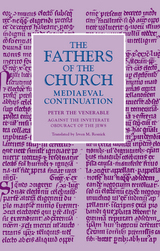
Against the Inveterate Obduracy of the Jews
Irven M. Peter the Venerable
Catholic University of America Press, 2013
With this translation, Irven M. Resnick makes the complete work available for the first time in English
[more]
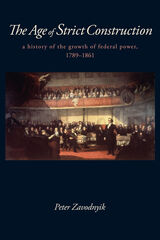
The Age of Strict Construction
a History of the Growth of Federal Power, 1789-1861
Peter Zavodnyik
Catholic University of America Press, 2007
The Age of Strict Construction explores the growth of the federal government's power and influence between 1789 and 1861, and the varying reactions of Americans to that growth.
[more]
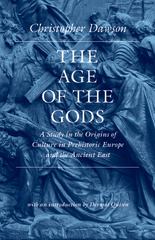
The Age of the Gods
Christopher Dawson
Catholic University of America Press, 2012
When first published in 1928, The Age of the Gods was hailed as the best short account of what is known of pre-historic man and culture. In it, Christopher Dawson synthesized modern scholarship on human cultures in Europe and the East from the Stone Age to the beginnings of the Iron Age.
[more]
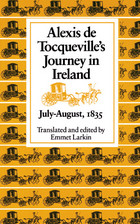
Alexis de Tocqueville's journey in Ireland, July-August, 1835
Alexis de Tocqueville
Catholic University of America Press, 1990
This edition of his journal is perhaps the first serious scholarly effort to place Tocqueville's journey to Ireland in its proper intellectual, geographical, and historical context.
[more]
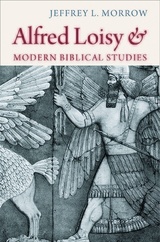
Alfred Loisy and Modern Biblical Studies
Jeffrey L. Morrow
Catholic University of America Press, 2019
The French Catholic priest and biblical scholar Alfred Loisy (1857-1940) was at the heart of the Roman Catholic Modernist crisis in the early part of the twentieth century. He saw much of his work as an attempt to bring John Henry Newman’s notion of development of doctrine into the realm of Catholic biblical studies, and thereby transform Catholic theology. This volume situates Loisy’s better known works on the New Testament and theology in the context of his lesser known work in Assyriology and Old Testament studies. His early training in Assyriology taught Loisy a comparative historical approach to studying ancient texts, in addition to providing him the requisite training in ancient Near Eastern languages and literature. Loisy built upon this Assyriological foundation with his historical critical work in biblical studies, first in the Old Testament. In his biblical scholarship, Loisy combined the then current trends of historical biblical criticism with his more comparative approach. Prior to his excommunication in 1908, Loisy attempted in his more popular writings to defend the inclusion of historical biblical criticism in the repertoire of Catholic biblical interpretation. He saw this as an important step in reforming Catholic theology. The Modernist crisis set the stage for the major debates that would occur in the Catholic theological world for more than a century. The controversy over Modernism became one important conflict that helped pave the way for the Second Vatican Council. The issues raised during Loisy’s time, remain contested today. Examining how Loisy approached biblical studies helps readers better understand his overall work, and the place it played in the pivotal intellectual turmoil of his day.
[more]
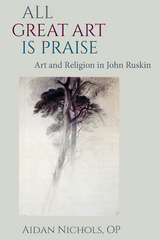
All Great Art is Praise
Aidan Nichols
Catholic University of America Press, 2016
The volume looks especially closely at Ruskin's changing attitudes to Catholicism. The son of a stoutly Bible-Protestant mother and a father politically opposed to the civil emancipation of Catholics, Ruskin found it increasingly difficult to combine his inherited anti-Catholicism with his appreciation of Byzantine-Venetian, Renaissance-humanist, and Franciscan-evangelical art and the program for living these contained or implied. The rumors in late life of his immanent conversion to Rome proved unfounded, but they were not implausible. All Great Art is Praise seeks to show why
[more]
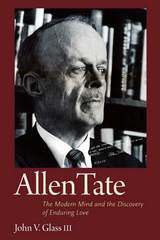
Allen Tate
John V. Glass III
Catholic University of America Press, 2016
This study reconsiders and reassesses the work of Allen Tate as a poet whose themes and expression place him among the most studied and canonical Modernists of the last century. Allen Tate (1899-1979), a former Poet Laureate of the US, although generally regarded during his lifetime as one of the twentieth century's preeminent literary critics and men of letters, has been largely overlooked by critics in the years since his death. John V. Glass III rectifies this by tracing the development of Tate's thought and verse from his early years as a student at Vanderbilt in the 1920s through his final terza-rima sequence completed in the 1950s. Tate's poetry in the intervening years charts the course of an American modernist who brings to bear on the problems of his age the unique perspective of a southerner, one who refuses either to accept sentimentality or to repudiate the past in his search for a solution to the dissociation of sensibility.
[more]
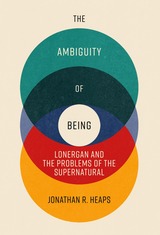
The Ambuiguity of Being
Lonergan and the Problems of the Supernatural
Jonathan R. Heaps
Catholic University of America Press, 2024
The debate in Catholic theology over the relationship between the natural and the supernatural has only occasionally engaged with Bernard Lonergan’s philosophical and theological contributions on the topic. The Ambiguity of Being argues that more detailed engagement with Lonergan’s work implies an oversight in both the 20th- and 21st-century debates. The Ambiguity of Being argues the controversy has failed to notice how the problem of the natural and the supernatural is, in fact, two problems. The Ambiguity of Being takes both problems in their widest sense to be about action—both divine and human. The first problem asks how God can act in human action. A question for Christians at least since St. Augustine faced the Pelagian controversy, Lonergan retrieved what he understood to be St. Thomas Aquinas’ mature solution. It is a solution gathering together a whole series of theological and philosophical developments into a subtle metaphysical theory of divine and human cooperation. But the recent debates have resituated this problem (and various interpretations of St. Thomas’s solution to it) in a modern world with modern concerns about culture and politics for the sake of answering a second, intrinsically related, but really distinct question: what is God doing in human action? Ambiguity finds that the recent controversy almost always finds participants attempting to deduce an answer to the second, modern problem from the medieval, metaphysical Thomist solution to the first. By contrast, The Ambiguity of Being argues at length the modern problem cannot be reduced to, nor an answer deduced from its medieval, metaphysical partner because the modern problem of the supernatural—what is God doing in human action?—is a hermeneutical problem that calls out for a hermeneutical answer. The Ambiguity of Being sketches a heuristic for what a fully adequate answer to this question would require, suggesting a radical re-conception of modern theology’s scope.
[more]
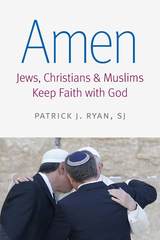
Amen
Patrick J. Ryan SJ
Catholic University of America Press, 2018
Amen: Jews, Christians, and Muslims Keep Faith with God examines faith as it is understood by Jews, Christians and Muslims; it does not aim to be a work of systematic theology or a lengthy explication of the contents of different faith traditions. It offers Jews, Christians and Muslims several approaches to faith as a category of human experience open to God: a faithful God who reaches out to grasp the faithful human being at the same time that the faithful human being reaches out to grasp a faithful God. This two-sided faith, divine and human, lies at the center of each faith tradition. The book examines faith as one might examine a gem, gazing at different facets in turn.
[more]
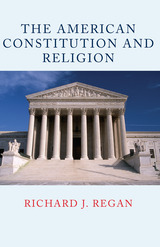
The American Constitution and Religion
Richard J. Regan
Catholic University of America Press, 2013
The Supreme Courts decisions concerning the first amendment are hotly debated, and the controversy shows no signs of abating as additional cases come before the court. Adding much-needed historical and philosophical background to the discussion, Richard J. Regan reconsiders some of the most important Supreme Court cases regarding the establishment clause and the free exercise of religion.
[more]
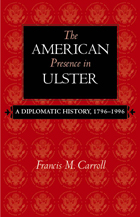
The American Presence in Ulster
A Diplomatic History, 1796–1996
Francis M. Carroll
Catholic University of America Press, 2005
Tells the story of the link between Ulster and the United States and presents the first general history of the U.S. Consulate in Belfast.
[more]
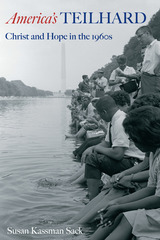
America's Teilhard
Susan Kassman Sack
Catholic University of America Press, 2019
America’s Teilhard: Christ and Hope in the 1960s is a study of the reception of Teilhard in the United States during this period and contributes to an awareness of the thought of this important figure and the impact of his work. Additionally, it further develops an understanding of U.S. Catholicism in all its dimensions during these years, and provides clues as to how it has unfolded over the past several decades. Susan Sack argues that the manner and intensity of the reception of Teilhard’s thought happened as it did at this point in history because of the confluence of the then developing social milieu, the disintegration of the immigrant Catholic subculture, and the opening of the church to the world through Vatican II. Additionally, as these social and historical events unfolded within U.S. culture during these years, the way Teilhard was read, and the contributions which his thought provided changed. This book considers his work as a carrier at times for an almost Americanist emphasis upon progress, energy and hope; in other years his teleological understanding of the value of suffering moves to center. Additionally, the stories of numerous persons – scientists, theologians, politicians, and scholars – who became involved in the American Teilhardian effort are detailed.
[more]
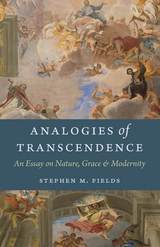
Analogies of Transcendence
Stephen M. Fields
Catholic University of America Press, 2016
The problem of nature and grace lies at the heart of Christian theology. No dimension of divine revelation can be addressed without implicitly drawing reference to this issue.Analogies of Transcendence focuses on the central role that the analogies of being and faith play in developing a solution to the problem. These link God, as self-manifesting transcendence, to the human person as both fallen and justified, and to the material cosmos. Although the proposed solution draws on the work of Maréchal, de Lubac, Balthasar, and Rahner, it criticizes their approach for its underdeveloped analogies that diminish nature in grace's engagement with it. In redressing this weakness, Fr. Fields adapts its solution to the intellectual struggle of our time. This volume examines the origins and structure of modernity, which, it asserts, has not been superseded and is therefore critical of'postmodernism,' as well as of some ambiguous legacies of Thomism.
[more]
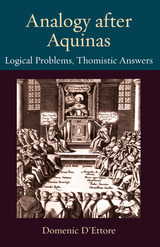
Analogy after Aquinas
Domenic D'Ettore
Catholic University of America Press, 2018
Since the first decade of the 14th Century, Thomas Aquinas’s disciples have struggled to explain and defend his doctrine of analogy. Analogy after Aquinas: Logical Problems, Thomistic Answers relates a history of prominent Medieval and Renaissance Thomists’ efforts to solve three distinct but interrelated problems arising from their reading both of Aquinas’s own texts on analogy, and from John Duns Scotus’s arguments against analogy and in favor of univocity in Metaphysics and Natural Theology. The first of these three problems concerns Aquinas’s at least apparently disparate statements on whether a name is said by analogy through a single concept or through diverse concepts. The second problem concerns the model of analogy suited for predicating names analogously across the categories of being or about God and creatures. Is “being” said analogously about God and creatures, or substance and accidents, on the model of how “healthy” is said of medicine and an animal, or on the model of how “principle” is said of a point and a line? The third problem comes from outside challenges to Aquinas’s thought, in particular Scotus’ claims that univocal names alone can mediate valid demonstrations, and any demonstration that failed to use its mediating terms univocally would fail by the fallacy of equivocation. Analogy after Aquinas makes a unique contribution to the study of philosophical theology in the tradition of Thomas Aquinas by showing the historical and philosophical connection between these three problems, as well as the variety of solutions proposed by leading representatives of this tradition. Thomists considered in the book include: Hervaeus Natalis (1250-1323), Thomas Sutton (1250-1315), John Capreolus (1380-1444), Dominic of Flanders (1425-1479), Paul Soncinas (d. 1494), Thomas dio vio Cajetan (1469-1534), Francis Silvestri of Ferrara (1474-1528), and Chrysostom Javelli (1470-1538).
[more]
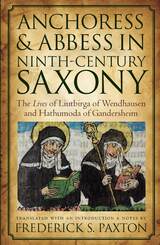
Anchoress and Abbess in Ninth-Century Saxony
The Lives of Liutbirga of Wendhausen and Hathumoda of Gandersheim
Frederick S. Paxton
Catholic University of America Press, 2009
In the growing field of early medieval texts in translation, this book presents the first full English translations of the Lives of Liutbirga of Wendhausen, the first anchoress in Saxony, and Hathumoda, the first abbess of Gandersheim.
[more]
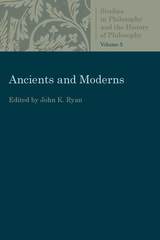
Ancients and Moderns
John K. Ryan
Catholic University of America Press, 2018
This volume is a collection of works by international scholars on Aristotle, Plato, Duns Scotus, Plotinus and Moritz Schlick.
[more]
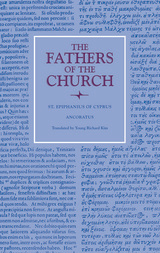
Ancoratus
Epiphanius of Cyprus
Catholic University of America Press, 2014
Epiphanius of Cyprus was lead bishop of the island from 367 until his death in 403, and he was a contemporary of several of the great church fathers of the patristic era, including Athanasius, Basil, and Jerome. He is well known among modern scholars for his monumental heresiology, the Panarion, as well as for his involvement in several ecclesiastical and theological controversies. Before he began to write his magnum opus, however, he had already completed the Ancoratus, an important theological treatise, written in the form of a letter to Christians in southern Anatolia. The Ancoratus addressed numerous theological issues, particularly in response to the continuous disputes about the divinity of the Son, the developing arguments over the divinity of the Holy Spirit, and the early quarrels over the Incarnation of Christ. In addition, he included his thoughts on proper biblical exegesis, the problematic theology of Origen, and the relationship of the Christian faith with Hellenistic culture. Epiphanius's convictions on these issues represented important contributions to the ongoing theological and cultural controversies of the late fourth century, but he has often been overshadowed in modern scholarship by the work of his more illustrious contemporaries. Because there has been no complete English translation of the Ancoratus to date, this volume adds significantly to the resources available for patristic studies.
[more]
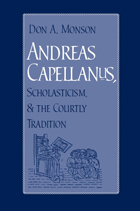
Andreas Capellanus, Scholasticism, and the Courtly Tradition
Don A. Monson
Catholic University of America Press, 2005
This book, the first study in English devoted entirely to Andreas Capellanus's De Amore, presents a comprehensive inquiry into the influence of scholasticism on the structure and organization of the work, applying methods of medieval philosophy and intellectual history to an important problem in medieval literary studies.
[more]
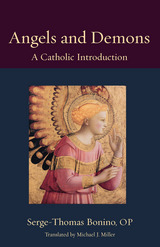
Angels and Demons
Serge-Thomas Bonino
Catholic University of America Press, 2016
Angels occupy a significant space in contemporary popular spirituality. Yet, today more than ever, the belief in the existence of intermediary spirits between the human and divine realms needs to be evangelized and Christianized. Angels and Demons offers a detailed synthesis of the givens of the Christian tradition concerning the angels and demons, as systematized in its essential principles by St. Thomas Aquinas. Certainly, the doctrine of angels and demons is not at the heart of Christian faith, but its place is far from negligible. On the one hand, as part of faith seeking understanding, angelology has been and can continue to be a source of enrichment for philosophy. Thus, reflection on the ontological constitution of the angel, on the modes of angelic knowledge, and on the nature of the sin of Satan can engage and shed light on the most fundamental areas of metaphysics, epistemology, and ethics. On the other hand, angelology, insofar as it is inseparable from the ensemble of the Christian mystery (from the doctrine of creation to the Christian understanding of the spiritual life), can be envisioned from an original and fruitful perspective.
[more]
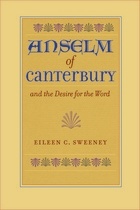
Anselm of Canterbury and the Desire for the Word
Eileen C. Sweeney
Catholic University of America Press, 2012
Sweeney's study offers a comprehensive picture of Anselm's thought and its development, from the early, intimate, monastically based meditations to the later, public, proto-scholastic disputations
[more]
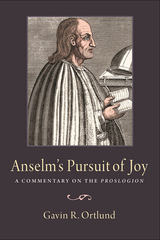
Anselm's Pursuit of Joy
A Commentary on the Proslogion
Gavin R. Ortlund
Catholic University of America Press, 2020
The interpretation of Anselm of Canterbury’s Proslogion has a long and rich tradition. However, its study is often narrowly focused on its so-called “ontological argument.” As a result, engagement with the text of this work tends to be lopsided, and the prayerful purpose that undergirds the whole book is often completely ignored. Even the most rigorous engagements with the Proslogion often have little to say, for instance, about how the prayers of Proslogion 1, 14, and 18 contribute materially to Anselm’s argument, or how his doctrine of God develops organically from the divine formula in the early chapters to the doctrines of eternity, simplicity, and Trinity in later chapters. There are very few works that offer a sustained analysis to Anselm’s flow of thought throughout the entire Proslogion, and no one has explored how Anselm’s doctrine of creaturely joy in heaven in Proslogion 24-26 is a fitting climax and resolution to the book.
Anselm’s Pursuit of Joy attempts a sustained, chapter-by-chapter textual analysis of the Proslogion, and offers the first effort to situate Anselm’s doctrine of heaven in Proslogion 24-26 as the climax of the earlier themes of Anselm’s work. Gavin Ortlund suggests that the basic purpose of Anselm’s argument in the Proslogion is to seek the visio Dei that he articulates as his soul’s deepest desire (Proslogion 1). While Anselm’s argument for God’s existence (Proslogion 2-4) is an important piece of this effort, it is only one step of a larger trajectory of thought that leads Anselm to meditate further on God’s nature as the highest good of the human soul (Proslogion 5-23), and then to anticipate the joy of possessing God in heaven (Proslogion 24-26). In other words, the establishment of God’s existence is only the penultimate consequence of Anselm’s famous formula “that than which nothing greater can be thought”—his ultimate concern is with the infinite creaturely joy that is entailed by his existence. The Proslogion is, far more than an argument for God’s existence, a meditation on God as the chief happiness of the human soul.
[more]
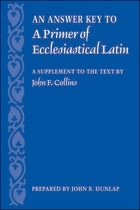
An Answer Key to 'A Primer of Ecclesiastical Latin'
John R. Dunlap
Catholic University of America Press, 2006
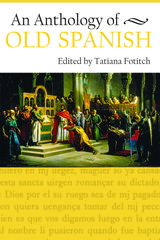
An Anthology of Old Spanish
Tatiana Fotitch
Catholic University of America Press, 2018
In this book, Tatiana Fotitch compiles some of the most fascinating Spanish-language texts from the late-ninth or early tenth century through to the fifteenth century. The selections are specifically aimed to garner the interests of students as they begin the study of Old Spanish, and hence covers a wide variety of different types of material. The anthology includes examples of Mozarabic poetry; the twelfth century Auto de los Reyes Magos and Cantar de Mio Çid; as well as the thirteenth century Roncesvalles, which tells of how Charlemagne, after the battle, mourns his chieftains. Fotitch also includes Gonzalo de Berceo’s Milagros de Nuestra Señora and several works by Alfonso the Wise, including his Libro de las partidas. Fotitch also includes the famous poem El Libro de Buen Amor as well as the playful set of fables known as El Libro de los Gatos.
[more]

Anthony of Padua
Franciscan, Preacher, Teacher, Saint
Valentin Strappazzon, Valentin
Catholic University of America Press, 2024
Anthony of Padua: Franciscan, Preacher, Teacher, Saint represents the culmination of a lifetime of scholarly work by Valentin Strappazzon (d. 2023) on Anthony of Padua and especially on his sermons and spirituality. About 20 years prior to this volume, he had penned a short overview of his life in the popular "Petites Vies" series in the French language. A few years before the publication of the book in question, he edited and published three significant volumes on the sermons of the saint.
Although the present volume has been written in a less rigorous and erudite manner, it is intended to be a solid historical and analytical treatment for a wider reading public interested in the life and preaching of this fascinating medieval friar. Particular attention is given to explaining how and why Anthony, once he became a Franciscan living in France and Italy, became the focus of intense waves of popular devotion to whom numerous miracles and wonders came to be attributed both in the Middle Ages and even in our own time. Being the penultimate work of this author, written in French and lucidly translated by Michael F. Cusato, Anthony of Padua is a work of intelligence and reflection on a medieval figure who has too often only been the subject of piety rather than an assessment of the towering spiritual person that he was.
[more]
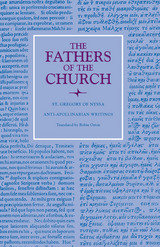
Anti-Apollinarian Writings
St. Gregory of Nyssa
Catholic University of America Press, 2016
The translation is interweaved with a commentary to provide the reader with some guidance through the complexities of Gregory's arguments. The introduction includes an overview of the history of Apollinarianism and discusses the extent to which it is possible to reconstruct, from the fragments quoted by Gregory, the arguments of Apolinarius's Apodeixis to which he is responding. It also examines the background to and the chronology of both of Gregory's anti-Apollinarian works, and looks critically at the arguments that they deploy.
[more]
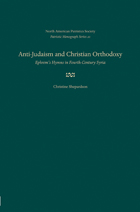
Anti-Judaism and Christian Orthodoxy
Ephrem's Hymns in Fourth-century Syria (Patristic Monograph Series)
Christine Shepardson
Catholic University of America Press, 2008
This book investigates the complex anti-Jewish and anti-Judaizing rhetoric of Ephrem, a fourth-century poet, deacon, and theologian from eastern Roman Syria whose Syriac-language writings remain unfamiliar and linguistically inaccessible to centuries of scholars who study the well-known Greek and Latin writings of his contemporaries.
[more]
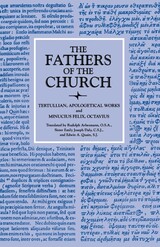
Apologetical Works; Octavius
Minucius Tertullian
Catholic University of America Press, 2008
No description available
[more]
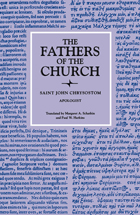
Apologist
Saint John Chrysostom
Catholic University of America Press, 1985
Apologist is the English translation of two of Chrysostom's treatises, written about 378 and 382, aimed at provoking the divinity of Jesus Christ.
[more]
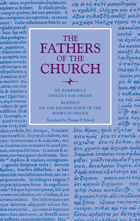
Apology for Origen; On the Falsification of the Books of Origen
Pamphilus
Catholic University of America Press, 2010
Presented here for the first time in English translation (from Rufinus's Latin version) is the Apology for Origen, the sole surviving work of St. Pamphilus of Caesarea (d. 310 AD), who was one of the most celebrated priest-martyrs of the ancient Church
[more]
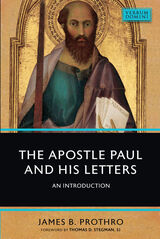
The Apostle Paul and His Letters
An Introduction
James B. Prothro
Catholic University of America Press, 2022
The letters of the Apostle Paul are central witnesses to the Christian faith and to the earliest history of Christianity. And yet, when students, preachers, and others turn to Paul, they find many things “hard to understand” (2 Peter 3:16) in these ancient writings.
James Prothro’s new book aims to help readers see the Apostle’s faith and hope at work as he evangelized the nations. Steeped in up-to-date scholarship and a passion for the gospel Paul preached, Prothro draws readers into Paul’s life and letters in order to help them hear the Apostle’s voice. The book’s chapters offer introductions to Paul’s background, life, and legacy; an introduction to ancient letter writing; a guide to understanding Paul’s theology across the letters; a survey of the portrait of Paul in the Book of Acts; separate treatments of each letter’s background and purpose; treatments of key theological topics in each letter and a thorough outline of each letter showing its arguments and how they make sense.
Prothro introduces complex matters with clarity, balance, and an inviting style. He not only offers answers but models how to ask questions, helping us reason through Paul’s letters as ancient documents and as Christian Scripture. This book will prove a valuable introduction for those who study, teach, and preach these biblical books.
[more]
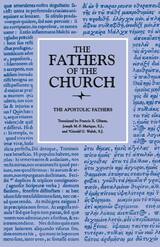
The Apostolic Fathers
The Apostolic Fathers
Catholic University of America Press, 1947
No description available
[more]
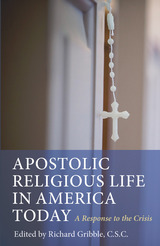
Apostolic Religious Life in America Today
A Response to the Crisis
Richard Gribble
Catholic University of America Press, 2011
Divided into two parts, this volume first presents an analysis of the problem and secondly a solution to place apostolic religious life on a positive trajectory in the 21st century.
[more]
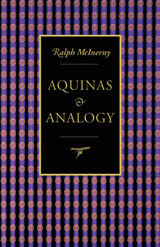
Aquinas and Analogy
Ralph McInerny
Catholic University of America Press, 1996
The basic distinctions McInerny introduces, his criticism of the central piece in the literature, Cajetan's De nominum analogia, the applications he makes to problems such as that of the nature of metaphysics or of logic, his knowledge of contemporary debates on related topics, combine to make his contribution unique
[more]
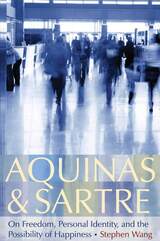
Aquinas and Sartre
On Freedom, Personal Identity, and the Possibility of Happiness
Stephen Wang
Catholic University of America Press, 2009
Thomas Aquinas and Jean-Paul Sartre are usually identified with completely different philosophical traditions: intellectualism and voluntarism. In this original study, Stephen Wang shows, instead, that there are some profound similarities in their understanding of freedom and human identity.
[more]
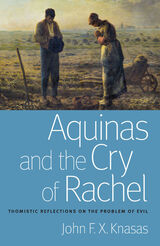
Aquinas and the Cry of Rachel
John F.X. Knasas
Catholic University of America Press, 2013
In Aquinas and the Cry of Rachel , John F. X. Knasas explores Thomas Aquinas's philosophical thinking about evil, and brings the results into discussion with the contemporary theodicies - philosophies of the problem of evil. It examines the relation of the human person and human nature to nature as a whole.
Generally speaking, possible philosophical accounts for evil are two kinds: cosmological or personal. The cosmological account has evils rebounding to the perfection of creation. The personal account would have evils suffered rebounding to the good of the sufferer. Knasas argues that for Aquinas no philosophical resolution of these two kinds of accounts
is possible. This argument is based upon Aquinas's understanding of the human as an intellector of analogical being. Such an understanding establishes two truths. First, the human is by nature only a principal part of the created whole. Second, there is the philosophically discernible possibility of supernatural elevation by the creator.
Hence, as far as philosophy can discern, evil may have a natural explanation or it may have a supernatural one. The Thomistic philosopher has no answer as to why evil exists because that philosopher discerns too many possible ones. In that respect, Aquinas's thinking on evil is similar to his thinking about the philosophical knowledge of the biblical
truth of the world's creation in time. Such a creation is one metaphysical possibility among others. Some authors that Aquinas and the Cry of Rachel considers are: Anthony Flew and Albert Camus, Jacques Maritain and Charles Journet, William Rowe, Marily McCord Adams, William Hasker, John Hick, David Ray Griffin, David Hume, Diogenes Allen, J. L. Mackie, Alvin Plantinga, Richard Swinburne, Bruce Reichenbach,
Brian Davies, and Eleonore Stump.
Generally speaking, possible philosophical accounts for evil are two kinds: cosmological or personal. The cosmological account has evils rebounding to the perfection of creation. The personal account would have evils suffered rebounding to the good of the sufferer. Knasas argues that for Aquinas no philosophical resolution of these two kinds of accounts
is possible. This argument is based upon Aquinas's understanding of the human as an intellector of analogical being. Such an understanding establishes two truths. First, the human is by nature only a principal part of the created whole. Second, there is the philosophically discernible possibility of supernatural elevation by the creator.
Hence, as far as philosophy can discern, evil may have a natural explanation or it may have a supernatural one. The Thomistic philosopher has no answer as to why evil exists because that philosopher discerns too many possible ones. In that respect, Aquinas's thinking on evil is similar to his thinking about the philosophical knowledge of the biblical
truth of the world's creation in time. Such a creation is one metaphysical possibility among others. Some authors that Aquinas and the Cry of Rachel considers are: Anthony Flew and Albert Camus, Jacques Maritain and Charles Journet, William Rowe, Marily McCord Adams, William Hasker, John Hick, David Ray Griffin, David Hume, Diogenes Allen, J. L. Mackie, Alvin Plantinga, Richard Swinburne, Bruce Reichenbach,
Brian Davies, and Eleonore Stump.
[more]

Aquinas and the Early Chinese Masters
Chinese Philosophy and Catholic Theology
Joshua Brown
Catholic University of America Press, 2025
Aquinas and the Early Chinese Masters lays intellectual foundations for the integration of Chinese philosophy into Catholic theology. Although Catholic theology in Chinese contexts has drawn upon Chinese philosophical concepts, few have attempted to develop a rigorous, systematic approach to testing what in the Chinese philosophical traditions can be fruitful or unfruitful for Catholic theological expression.
This book attempts to model such an approach by engaging classical Chinese philosophy with the mind and spirit of St. Thomas Aquinas, who read Aristotle and other pagan philosophers with both charitable appreciation and a firm, critical eye. It applies this Thomistic lens through concrete comparative engagements with three main representatives of early Chinese philosophy: Mencius (Mengzi孟子), Xunzi荀子, and Mozi墨子. In each chapter, the book presents Aquinas’ thought as an evaluative frame for perceiving how Chinese philosophical commitments and concepts do or do not seem fit for adoption into Catholic theological science.
Following the general structure of the Summa theologiae, the book is comprised of six chapters touching on the doctrine of God, morality, and Christology. The first two chapters engage Confucian master Mengzi’s notion of Heaven (Tian天), and then the Mohist doctrine of Heaven’s Will (Tian zhi天志). Chapter three provides a Thomistic assessment of the two main positions in the classical Confucian debate on the goodness of man’s moral nature (renxing人性). Chapter four compares Aquinas’ account of charity and Mozi’s doctrine of “universal love” (jian ai兼愛). Chapter 5 offers a Thomistic assessment of the possibility of understanding Christ in terms of Xunzi’s “sage” (shengren聖人). Finally, Chapter 6 explores Christ as a moral teacher by putting Aquinas’ reading of Matt 8:21-22 into conversation with Confucian ethics of filial virtue.
[more]
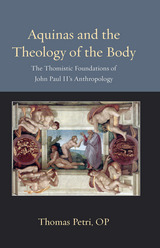
Aquinas and the Theology of the Body
Thomas Petri
Catholic University of America Press, 2016
Pope John Paul's Theology of the Body catecheses has garnered tremendous popularity in theological and catechetical circles. Students of the Theology of the Body have generally interpreted it as innovative not only in its presentation of the Church's teaching on marriage and sexuality, but also as radically advancing that teaching. Aquinas and the Theology of the Body offers a somewhat different interpretation. Fr. Thomas Petri argues that the philosophy and theology of Thomas Aquinas substantially contributed to John Paul's intellectual formation, which he never abandoned. A correct interpretation of the Theology of the Body requires, therefore, a thorough understanding of Thomistic anthropology and theology, which has been mostly lacking in commentaries on the pope's important contributions on the subject of marriage and sexuality.
[more]

Aquinas at 800
Commemorative Studies 1225-2025, Volume 1
David Cory
Catholic University of America Press, 2025
These volumes gather together the latest research from 40 of the world's most eminent Thomistic theologians and philosophers, in commemoration of the 800th anniversary of Thomas Aquinas's birth. To mark this anniversary, these scholars each prepared a chapter that is an original research study shared at a major international conference in September 2024. The volumes cover a wide range of both philosophical and theological topics, reflecting the breadth of Aquinas's own thought, and will be organized by subject matter. Together, these volumes will provide a compendium of outstanding research on the wide spectrum of Aquinas's thought, which we hope will have enduring value for the field, offering an opportunity to revisit the ongoing importance of the work of Thomas Aquinas today.
[more]

Aquinas at 800
Commemorative Studies 1225-2025, Volume 2
David Cory
Catholic University of America Press, 2025
These volumes gather together the latest research from 40 of the world's most eminent Thomistic theologians and philosophers, in commemoration of the 800th anniversary of Thomas Aquinas's birth. To mark this anniversary, these scholars each prepared a chapter that is an original research study shared at a major international conference in September 2024. The volumes cover a wide range of both philosophical and theological topics, reflecting the breadth of Aquinas's own thought, and will be organized by subject matter. Together, these volumes will provide a compendium of outstanding research on the wide spectrum of Aquinas's thought, which we hope will have enduring value for the field, offering an opportunity to revisit the ongoing importance of the work of Thomas Aquinas today.
[more]
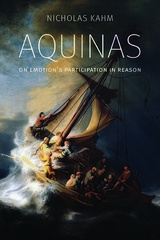
Aquinas on Emotion's Participation in Reason
Nicholas Kahm
Catholic University of America Press, 2019
Aquinas on Emotion’s Participation in Reason aims to present Aquinas’s answer to the perennial and now popular question: In what way can the emotions be rational? For Aquinas, the starting point of this inquiry is Aristotle’s claim (EN. I. 13) that there are three parts to the soul: 1) the rational part, 2) the non-rational part which can participate in reason, and 3) the non-rational part that does not participate in reason. It is the extent to which the second part (the sense appetites, the seat of the emotions) participates in reason that the emotions can become rational. However, immediately after Aristotle introduces his tripartite division of the soul, he warns that one need not delve into the details of the division or the participation. Aquinas, however, ignores Aristotle, and uses his precise metaphysics of participation within in his sophisticated anthropology to great effect in his ethics. Unlike Aristotle, to fully understand Aquinas’s thinking on how the emotions can become rational, we simply must delve into the kinds of precisions that Aristotle thinks are misplaced. When Aquinas’s views emerge from these precisions, he has a surprisingly level-headed and commonsense view of how the emotions can become rational. On this point, he is more pessimistic than Aristotle and more optimistic than Kant; he is certainly not, as is he is often thought to be, the faithful follower of Aristotle and the polar opposite of Kant. Nicholas Kahm argue that Aquinas has a realistic and plausible view of how far reason can go in shaping our emotions. Furthermore, his plausible views can accommodate the serious current challenge raised against virtue ethics from social psychology. The method has mainly been a careful reading of primary texts, but unlike the rest of the scholarship on Aquinas’s ethics, Kahm is particularly sensitive to Aquinas’s historical and philosophical development.
[more]
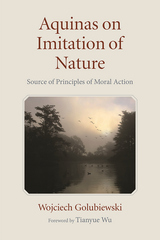
Aquinas on Imitation of Nature
Source of Principles of Moral Action
Wojciech Golubiewski
Catholic University of America Press, 2022
Aquinas on Imitation of Nature highlights and explores the doctrine of the imitation of nature, a crucial aspect of Aquinas’ metaethics and fills the gap in research on Aquinas’ moral doctrine and theory of action. It conveys Aquinas’ doctrine of the imitation of nature as a natural feature of right practical reason regarding moral thinking and action, indeed as an indispensable feature of virtuous flourishing in individual and communal aspects of human life.
The book starts with an overview of some of recent interpretations of Aquinas’ moral doctrine and natural law, introducing the need to explore the role of the imitation of nature in human practical reasoning and action in this area of Aquinas’ teaching. The chapters that follow are based on a careful reading of selected texts of Aquinas, and gradually develop a thorough and comprehensive picture of his doctrine of the imitation of nature as a source of practical principles. The final chapter provides various examples of how Aquinas understands the imitation of nature in the realm of moral reasoning and action.
The originality of this volume comes from its account of Aquinas’ medieval doctrine of the imitation of nature, in light of which the principles of right practical reason and virtuous action are congruent with and epistemologically dependant upon the basic terms of the movements of natural, sensible, non-rational agents. Through its thorough reading of Aquinas on the imitation of nature, the book aims to open new ways of appropriation of the metaphysical and natural tenets of his moral doctrine in the areas of theory of action, practical reason, natural law, and contemporary virtue ethics.
[more]
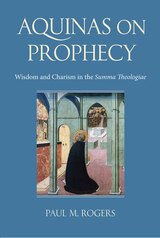
Aquinas on Prophecy
Wisdom and Charism in the Summa Theologiae
Paul M. Rogers
Catholic University of America Press, 2023
Aquinas on Prophecy argues that a lacuna exists (especially among Anglophone scholars of Aquinas) that neglects to identify his most famous work as a prophetic witness to the transformative effect of Christian theology. Through a detailed examination of Aquinas’s treatment of prophecy in the Summa Theologiae (II-II, QQ.171-174), Paul Rogers reveals how prophetic testimony is central to the understanding of Christian revelation, faith, and theology, since it presents an initial (and historically-rooted) model for a Christian pedagogy that attempts to affect intellectual and moral transformation through communicating knowledge about God.
The theologian thus conceived by Aquinas exercises analogously a prophetic, and hence social, function among Christian believers that has a special care for their spiritual and moral guidance. In contrast to readings of Aquinas that portray him as overly reliant on Aristotelian gnoseology (e.g., Jenkins 1997), Rogers lays out a reading more in line with recent ‘ressourcement’ Thomistic interpreters that identifies in his account of prophecy a creative adaptation of Arabic-Aristotelian gnoseology in the service of clarifying difficulties that had arisen in the thirteenth century surrounding the reception of a patristic (and predominantly Augustinian) tradition of prophetic illumination or vision. In the hands of Aquinas, the traditional Augustinian theory of prophetic illumination was re-envisioned and reinvigorated, which in turn allowed him to reassert confidently prophecy’s status as certain knowledge (scientia) that required its own distinct ‘light’, comparable to the light of natural reason and the lights of faith and glory.
Highlighting prophecy in Aquinas’s thought helps especially to refocus today’s readers on how knowledge of the final end as revealed was for Aquinas the ultimate moral objective shared by both the prophet and theologian: a point that is best appreciated when his account of prophecy is related back to his understanding of sacred doctrine and faith as a whole—the book’s central task.
[more]
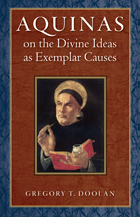
Aquinas on the Divine Ideas as Exemplar Causes
Gregory T. Doolan
Catholic University of America Press, 2008
Gregory T. Doolan provides here the first detailed consideration of the divine ideas as causal principles. He examines Thomas Aquinas's philosophical doctrine of the divine ideas and convincingly argues that it is an essential element of his metaphysics
[more]
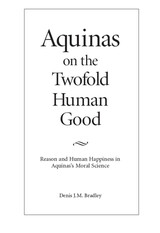
Aquinas on the Twofold Human Good
Reason and Human Happiness in Aquinas's Moral Science
Denis J. M. Bradley
Catholic University of America Press, 1997
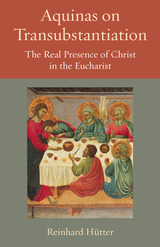
Aquinas on Transubstantiation
Reinhard Hutter
Catholic University of America Press, 2019
Aquinas on Transubstantiation treats one of the most frequently mis-understood and mis-represented teachings of Thomas Aquinas—Eucharistic transubstantiation. The study interprets Aquinas’s teaching as an exercise of “holy teaching” (sacra doctrina) that intends to show theologically and back up philosophically the simple yet profound thesis that “transubstantiation” affirms nothing but the truth of Christ’s words at the Last Supper—“This is my body,” “This is my blood.” Yet in order to achieve a contemporary ressourcement of this simple yet profound truth, it is necessary to probe the depths of Thomas Aquinas’s philosophical interpretation of it. For Thomas Aquinas, in regarding the truth of Eucharistic conversion, it is faith that preserves the human intellect from missing or dismissing the mystery announced in Christ’s words. Faith, however, is not intellectually blind, a faith that, as is often erroneously held, is commanded by arbitrary divine dictates to which the will submits in blind obedience. Rather, Aquinas takes faith is sustained, but not constituted, by an intellectual contemplation of the proposed mystery of faith, by faith seeking understanding. Thomas Aquinas unfolds this exercise of understanding guided by faith in the medium of a metaphysical contemplation that affords a profound intellectual appreciation of this central mystery of faith—precisely as mystery. Thomas’s metaphysical contemplation of Eucharistic conversion gestures toward the blinding light of superintelligibility, experienced as the unique darkness that surrounds this sublime mystery of faith. A ressourcement in Thomas Aquinas’s doctrine of transubstantiation also affords an renewed appreciation of the Church’s affirmation of transubstantiation as the most apt term for the interpretation of the mystery of Eucharistic conversion and a greater precision of what is centrally at stake in this mystery in the ongoing ecumenical conversation of this most central Christian teaching. A doctrinally sound, ecumenically informed, and philosophically reflected contemporary Catholic theology cannot afford to ignore or dismiss Aquinas’s surpassing account of Eucharistic conversion.
[more]
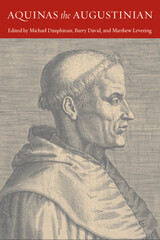
Aquinas the Augustinian
Michael Dauphinais
Catholic University of America Press, 2007
The book is composed of eleven essays by an international group of renowned scholars from the United States, England, Switzerland, Holland, and Italy
[more]
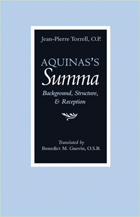
Aquinas's Summa
background, structure, & reception
Jean-Pierre Torrell
Catholic University of America Press, 2005
In this concise new volume by the acclaimed author of the biography of Saint Thomas Aquinas, Jean-Pierre Torrell brings his expertise to bear on Aquinas's Summa Theologiae.
[more]
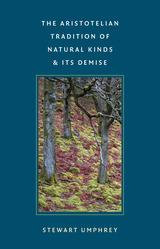
The Aristotelian Tradition of Natural Kinds and Its Demise
Stewart Umphrey
Catholic University of America Press, 2018
There are two great traditions of natural-kinds realism: the modern, instituted by Mill and elaborated by Venn, Peirce, Kripke, Putnam, Boyd, and others; and the ancient, instituted by Aristotle, elaborated by the “medieval” Aristotelians, and eventually overthrown by Galilean and Newtonian physicists, by Locke, Leibniz, and Kant, and by Darwin. Whereas the former tradition has lately received the close attention it deserves, the latter has not. The Aristotelian Tradition of Natural Kinds and its Demise is meant to fill this gap. The volume’s theme is the emergence of Aristotle’s account of species, what Schoolmen such as Thomas Aquinas and William of Ockham did with this account, and the tacit if not explicit rejection of all such accounts in modern scientific theory. By tracing this history Stewart Umphrey shows that there have been not one but two relevant “scientific revolutions” or “paradigm shifts” in the history of natural philosophy. The first, brought about by Aristotle, may be viewed as a renewal of Presocratic natural philosophy in the light of Socrates’s “second sailing” and his insistence that we attend to what is first for us. It features an eido-centric conception of living organisms and other enduring things, and strongly resists any reduction of physics to mathematics. The second revolution, brought about by seventeenth-century physics, features a nomo-centric view according to which what is fundamental in nature are not enduring individuals and their kinds, as we commonly suppose, but rather certain mathematizable relations among varying physical quantities. Umphrey examines and compares these two very different ways of understanding the natural order.
[more]
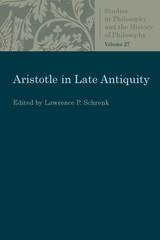
Aristotle in Late Antiquity
Lawrence P. Schrenk
Catholic University of America Press, 2018
Consisting of nine studies, this volume presents a series of specific insights on Aristotle's influence from Plotinus through Arabic thought.
[more]
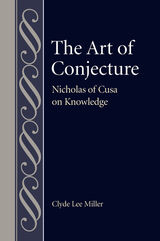
The Art of Conjecture
Nicholas of Cusa on Knowledge
Clyde Lee Miller
Catholic University of America Press, 2021
“Learned ignorance,” the recognition that God is beyond us and our knowing capacities is the theological concept for which Nicholas of Cusa is most famous. Despite God’s apparent absence Nicholas offers original ways to think about God that would unite his presence with his absence. He called these proposals “conjectures” (coniecturae). Conjecture and conjecturing are central to the methodology of Nicholas’s philosophical theology and to his thinking about human knowledge.
By using concrete examples from the everyday life of his times as symbolic imagery Nicholas makes what we say about God imaginatively available and theoretically plausible. He called such conjectural symbols “aenigmata” (= “symbolic or ‘enigmatic’ conjectures”) because they partially clarify and likewise point to an exact truth that is beyond us. Novel and imaginative, Nicholas’s conjectural examples break with the traditional medieval Aristotelian examples and provide further evidence of his role as a figure bridging medieval and Renaissance thought.
Following his earlier book, Reading Cusanus (The Catholic University of America Press, 2003), Clyde Lee Miller here examines and comments on the meaning of “conjecture” in Nicholas of Cusa. The Art of Conjecture: Nicholas of Cusa on Knowledge explores what Nicholas meant by conjecture and its import as demonstrated in his treatises and sermons. Beginning with Nicholas’ On Conjectures, Miller analyzes a series of conjectural symbols and proposals across Nicholas’s less frequently discussed texts and recently published sermons. This early Renaissance thinker offers an original and ground-breaking way of framing speculation in philosophical theology and more generally in philosophy itself.
[more]
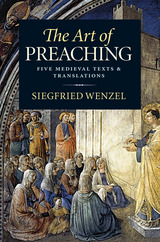
The Art of Preaching
Siegfried Wenzel
Catholic University of America Press, 2013
Based on his wide-ranging knowledge of late-medieval Latin sermons from England as well as his editorial experience with medieval Latin texts, Siegfried Wenzel offers critical editions of five instruction manuals on the "art of preaching" dating from 1230 to the fifteenth century. Four of the texts are edited and translated for the first time; the fifth is re-edited from all extant manuscripts. Each of the five sermons is accompanied by a facing-page translation into English. The book aims to stimulate interest and new research in a field that still awaits closer analysis of the relationships among existing treatises and of their historical development.
[more]
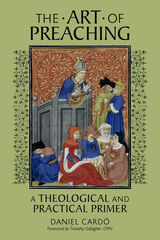
The Art of Preaching
A Theological and Practical Primer
Daniel Cardo
Catholic University of America Press, 2021
The growing awareness of the importance of preaching is a sign of our times. In the past decades, conscious that a renewal of preaching is essential for a renewed evangelization, many seminaries have implemented homiletic courses. However, there is still a real limitation of good and systematic resources in order to learn the theological depth and practical elements of the art of preaching.
The Art of Preaching: A Theological and Practical Primer aims to fill that gap. It explores the theological understanding of the homily, lessons from classical and contemporary rhetoric, the relevance of preaching for the life of the Church, highlighting recent teachings of the Magisterium, and it presents the incarnation as the foundation for preaching, understood as an essential aspect of the priestly life and mission.
This primer also offers a simple and effective method for the preparation and delivery of homilies, illustrating this by the example of brilliant preachers and exploring the idea of preaching as locus theologicus, i.e., the privileged place for the exercise of theology today. It is in deepening in the value and importance of preaching that theology can be renewed as a living and essential part of the daily life of priests. Seeing the homily not as a burden but as an occasion to fulfill the priestly identity will offer the opportunity to embrace the preparation for preaching as a key for unity among the many tasks and demands of pastoral life. In the homily prayer, study, and work come together.
The Art of Preaching will also provide a selection of homilies from the great preachers of the Church, organized chronologically, with brief introductions and commentaries that highlight what those homilies teach us for our preaching today. Only learning from the best preachers can we hope to preach effectively in our times.
[more]
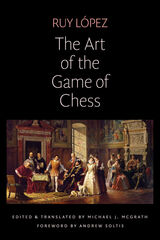
The Art of the Game of Chess
Ruy López
Catholic University of America Press, 2020
The Art of the Game of Chess is the first English translation of Fr. Ruy López’s 1561 book about chess, Libro de la invención liberal y arte del juego del ajedrez. López was a priest who served as King Philip II’s confessor and royal advisor. As a connoisseur of chess, King Philip II promoted the game in his court, and it did not take long for López to become known as Spain’s and one of Europe’s greatest chess players.
López is widely acclaimed as one of the most influential chess thinkers of all time whose theories of chess are an integral part of how chess is played today. Academics, including historians, linguists, sociologists, and Hispanists, as well as non-academics, especially chess enthusiasts, will appreciate this translation, which opens with a Foreword by Andrew Soltis, who is a Grandmaster and a United States Chess Hall of Fame Inductee, and includes a critical introduction and more than 275 footnotes.
[more]
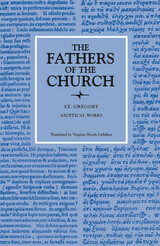
Ascetical Works
Saint Gregory of Nyssa
Catholic University of America Press, 1967
No description available
[more]
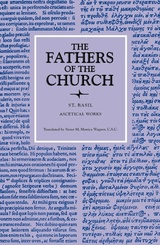
Ascetical Works
Saint Basil
Catholic University of America Press, 1950
No description available
[more]
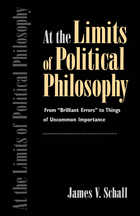
At the Limits of Political Philosophy
From "Brilliant Errors" to Things of Uncommon Importance
James V. Schall
Catholic University of America Press, 1996
James V. Schall presents, in a convincing and articulate manner, the revelational contribution to political philosophy, particularly that which comes out of the Roman Catholic tradition.
[more]
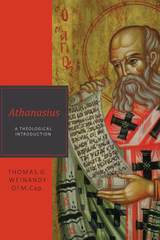
Athansius
A Theological Introduction
Thomas G. Weinandy, OFM, Cap.
Catholic University of America Press, 2018
Thomas Weinandy has done an excellent job in this book in introducing Athanasius' theology. A well-known Catholic scholar in historical theology, Weinandy has provided students of theology with a profound historiography of Athanasius' major theological writing. - Calvin Theological Journal
"A reliable, concise introduction to the theology of Athanasius." - International Journal of Systematic Theology
"A sustained and intelligent introduction to Athanasius and his literature, and will rightly appear on all undergraduate patristic bibliographies." - The Journal of Theological Studies
"A very fine theological (as its subtitle emphasizes) introduction to the Alexandrian bishop…[an] accessible, intelligent, and worthy volume, which offers the reader an overview of Athanasius's thought within the context of his full, if at times harried, ecclesiastical life." - Nova et Vetera
"Weinandy offers a summary of Athanasius' central works and a balanced assessment of his theology's merits and contemporary significance…No student of Athanasius should overlook this reliable guidebook to the little Alexandrian's great life and works." - Religious Studies Review
"Weinandy's introduction to Athanasius is an important work, familiarizing the reader with Athanasius' life, writings, and fundamental concerns. Throughout, the centrality of soteriology clearly emerges, whether the topic is the doctrine of the Trinity or the life of Antony. Hopefully this book will serve to bring Athanasius' soteriology more prominently into contemporary discussions alongside the other great masterpieces on this doctrine." - Themelios
"A reliable, concise introduction to the theology of Athanasius." - International Journal of Systematic Theology
"A sustained and intelligent introduction to Athanasius and his literature, and will rightly appear on all undergraduate patristic bibliographies." - The Journal of Theological Studies
"A very fine theological (as its subtitle emphasizes) introduction to the Alexandrian bishop…[an] accessible, intelligent, and worthy volume, which offers the reader an overview of Athanasius's thought within the context of his full, if at times harried, ecclesiastical life." - Nova et Vetera
"Weinandy offers a summary of Athanasius' central works and a balanced assessment of his theology's merits and contemporary significance…No student of Athanasius should overlook this reliable guidebook to the little Alexandrian's great life and works." - Religious Studies Review
"Weinandy's introduction to Athanasius is an important work, familiarizing the reader with Athanasius' life, writings, and fundamental concerns. Throughout, the centrality of soteriology clearly emerges, whether the topic is the doctrine of the Trinity or the life of Antony. Hopefully this book will serve to bring Athanasius' soteriology more prominently into contemporary discussions alongside the other great masterpieces on this doctrine." - Themelios
[more]
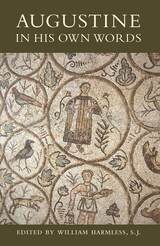
Augustine in His Own Words
William Harmless
Catholic University of America Press, 2010
This volume offers a comprehensive portrait--or rather, self-portrait, since its words are mostly Augustine's own--drawn from the breadth of his writings and from the long course of his career
[more]

Augustine in the Pelagian Controversy
Defending Church Unity
Andrew Chronister
Catholic University of America Press, 2024
This book examines St. Augustine of Hippo’s involvement in the Pelagian controversy and argues that this involvement was prompted not simply by his opposition to Pelagian doctrinal views but, to a significant degree, by his desire to defend Church unity. To prove this thesis, Andrew Chronister analyzes the historical context of the controversy as well as Augustine’s argumentation in his anti-Pelagian works.
Attending to the historical context reveals the fact that at various moments in the controversy, Augustine was faced with what he believed to be significant threats to Church unity. For example, the beginnings of the controversy coincided with a key attempt in June 411 to end the Donatist schism that had split the African Church for a century: at the very moment when one schism was being healed, another threat to unity appeared in Caelestius and Pelagius.
At the same time, internal evidence in Augustine’s anti-Pelagian works reveals his desire not only to refute Pelagian doctrinal views but also to undermine the Pelagians’ claims that they were simply teaching what the Church had always and everywhere taught. This can be seen in a particular way in Augustine’s frequent appeals to liturgical and sacramental praxis as well as in his rather novel practice of citing renowned Christian authors as evidence for the antiquity and universality of his views.
Augustine in the Pelagian Controversy has two main contributions: (1) it offers a new perspective on Augustine’s involvement in the controversy that makes his prolonged and polemical engagement with the Pelagians more intelligible and (2) it provides a detailed history of the controversy itself.
[more]
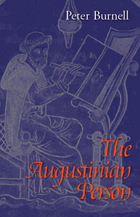
The Augustinian Person
Peter Burnell
Catholic University of America Press, 2005
Through careful analysis of Augustine's writings, Burnell concludes that Augustine conceives of human nature as a unity at every level--socially, morally, and in basic constitution--despite very common objections that he fails to achieve such a conception
[more]
READERS
Browse our collection.
PUBLISHERS
See BiblioVault's publisher services.
STUDENT SERVICES
Files for college accessibility offices.
UChicago Accessibility Resources
home | accessibility | search | about | contact us
BiblioVault ® 2001 - 2024
The University of Chicago Press


